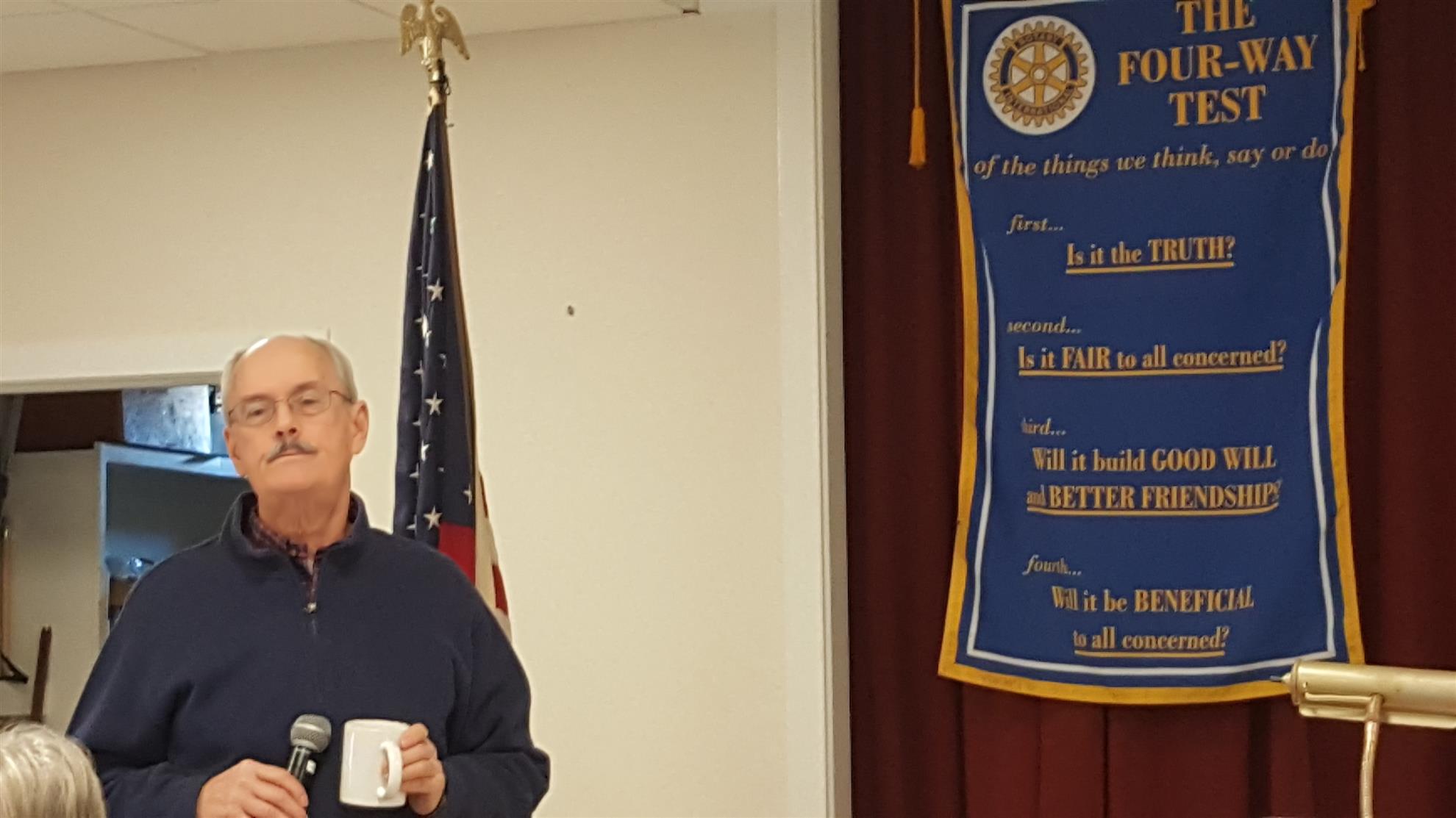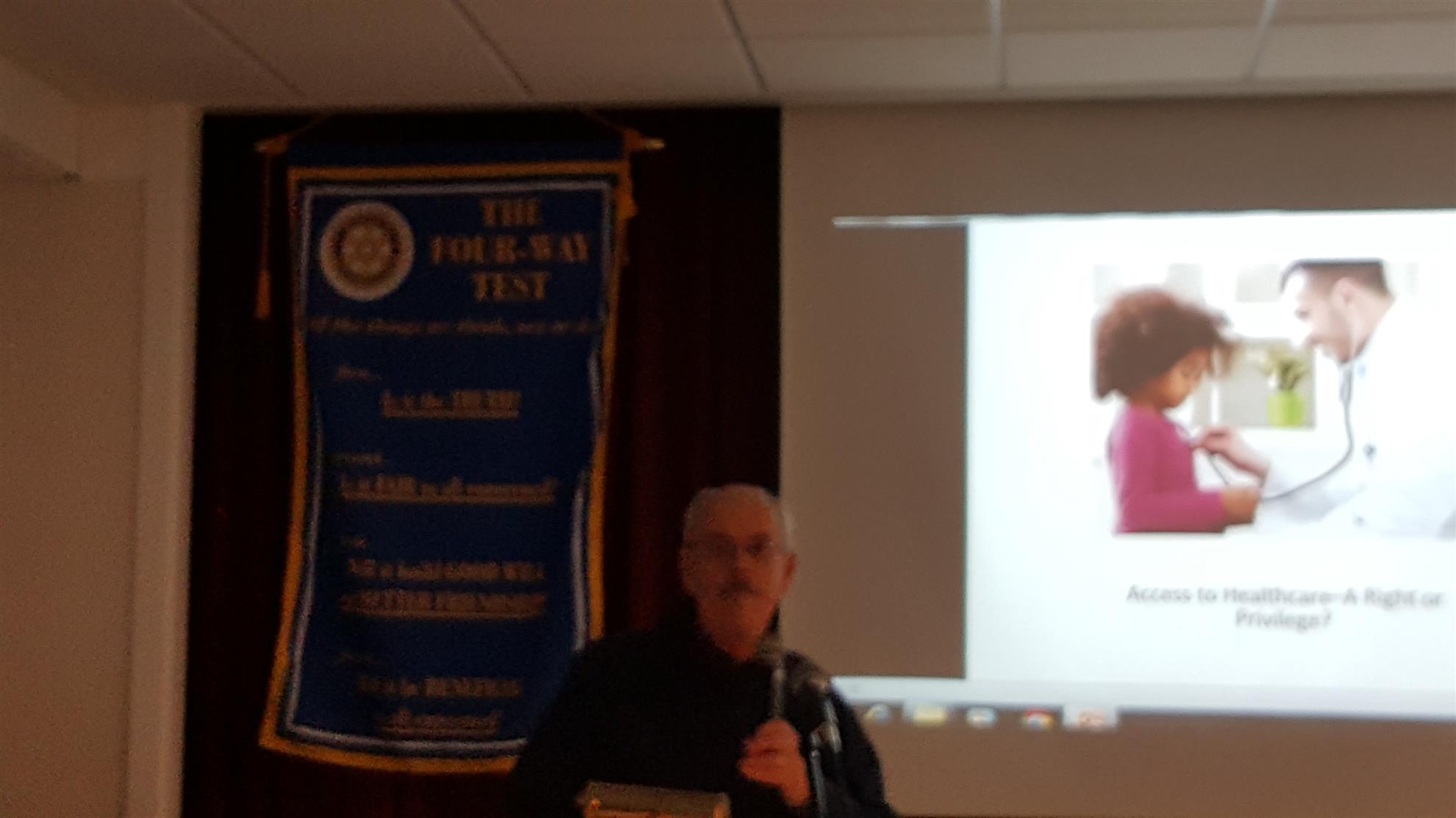Roy Hitchings, A ccess to Healthcare
ccess to Healthcare
 ccess to Healthcare
ccess to Healthcare George Abendroth encouraged people to let Etienne know ideas of any speakers for the club
Buckets on the Table are to benefit Camden Area Christian Food Pantry
Roy Hitchings focused on the idea of considering not whether people should have access to adequate healthcare, but how to provide it. The affordability issue is probably the overriding issue. He shared the number of countries that provide universal health care, most of the wealth industrialized countries and Cuba. Not the United States. In Germany the system is not run by the government, but involves exclusively non-profit health insurance companies. In places like England, it is run by the government. Some people like the elderly and veterans have single-payer health systems, and about 12% of people in the US are uninsured. Most are working poor US citizens, and more blacks and hispanics are uninsured than whites. Timely access to health care leads to better health. Chronic un-diagnosed diseases result from lack of timely access, which declines in the absence of insurance. 41% of the uninsured to not have a doctor, versus 10% of the insured. Relying on emergency department care is not only expensive, but episodic, and does not provide consistent preventative care. Mortality is higher for people without insurance has been shown to be higher across ages 25-64. Being uninsured results in poorer health outcomes, lacking funds for prescriptions, care for chronic illness like asthma, diabetes, vaccines and higher rate of premature death. He thinks access is a basic human right, supported by the constitution, accepted by major international organizations, makes good economic sense but unaffordable.

He said that those opposed to universal healthcare think the country can't afford it, or that it will deny others. He believes the money is already there, but needs to be spent differently. He said many confuse universal care with single-payer. But he mentioned the case of Germany, and subsidies to make insurance affordable through subsidies.
The moral issue and the cost issue must be resolved to provide universal access. He doesn't think that people understand what lack of access can mean and how it impacts lives.
The thinks that when we see healthcare as a right, not a privilege, we will bring the discussion to not whether we should provide access, but how to do it. The Kaiser Family Foundation, Maine Health Access Foundation, Maine Equal Justice Partners, Mainers for Affordable Healthcare, and the book "Healing of America" by Tom Reid, which he read and convinced him of the need for universal access.

Sherry Cobb spoke about a project with the AIO Foodpantry and the weekend backpack program they have. In 17 schools, every Friday they send kids home with packaged foods involving about 35 volunteers who meet at the Nativity Lutheran church to load the bags for the kids backpacks. This week, 322 bags of food are going home with children this weekend. She reminded us that kids who go hungry can't learn and also have related health issues. Almost half of the children in Knox County are living with food insecurity. 89% of Rockland children are food insecure, down from 91% in 2016.
Ray Fink and Sandy spoke about Christmas Tree sales. Ray addressed the gifts available from the new Gift Shop, including buying an experience at David Jacobsen's glass blowing studio. Sandy demonstrated the Square platform for taking credit card and debit payments After entering the password, which everyone knows, both Bob Rubin's and Sandy Cox's phone numbers are there and they are available at a moment's notice if help is needed. The screen has product icons, including a "Store" icon. David Jacobson will be there Sunday between 2 and 4p.
Terry Bregy said sign-ups are going well, and two slots per member will fill the schedule. He thanked those who came out in the rain on Wednesday to help unload and set up the trees.

